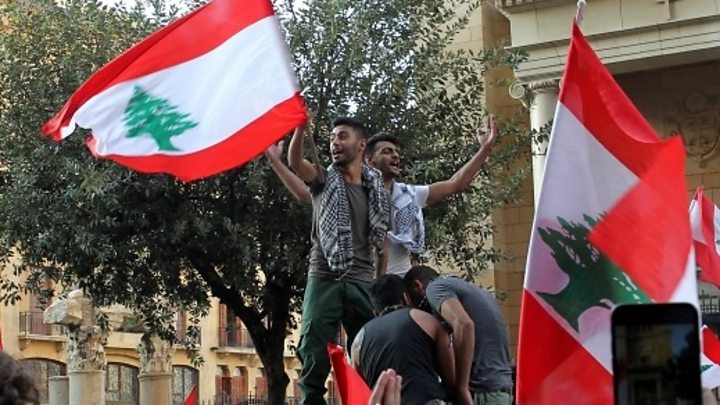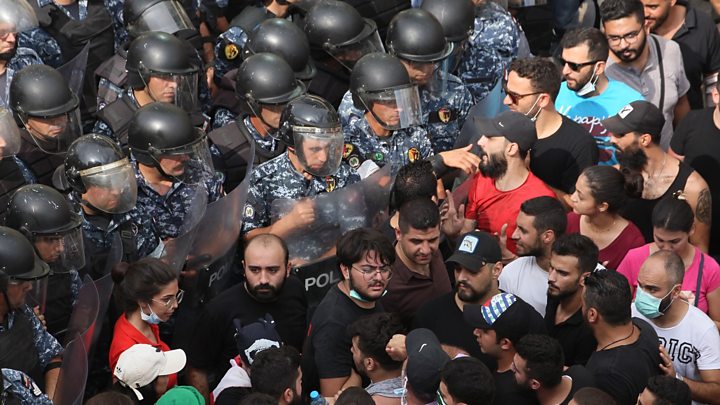
Lebanon’s coalition government has approved a package of economic reforms as it attempts to quell the biggest protests in years.
The proposals reportedly involve scrapping new taxes and halving the salaries of top officials.
The government’s move came as people took part in a fifth day of protests, amid calls for a general strike.
Hundreds of thousands have taken to the streets to express their anger against corruption and austerity measures.
The Lebanese economy is struggling with low growth and high debt.
Proposed new taxes – including one on voice calls via WhatsApp and other messaging services that was quickly scrapped after being announced last Thursday – have sparked anger and deteriorating infrastructure has made power cuts and piles of uncollected rubbish part of daily life.
What’s the latest?
On Friday, Prime Minister Saad Hariri gave his coalition partners 72 hours to approve economic reforms to ease the crisis, hinting he might resign if they did not.
Image copyright
Reuters
Lebanese President Michel Aoun (R) chaired a cabinet meeting on Monday
Four ministers from the right-wing Christian Lebanese Forces party resigned late on Saturday. Their leader, Samir Geagea, said he no longer believed the government could resolve the economic crisis.
But on Sunday night, official sources told Reuters news agency that the other parties had agreed to:
- Reduce the salaries of presidents, ministers and MPs by 50%
- Ask banks for $3.3bn (£2.5bn) in contributions to achieve a “near zero deficit” for the 2020 budget
- Privatise the telecommunications sector and overhaul the electricity sector
- Set up new regulatory and transparency bodies
On Monday morning, President Michel Aoun chaired a cabinet meeting to discuss the reforms package at the Baabda palace.
Image copyright
AFP
People blocked main roads in Beirut ahead of the cabinet meeting
Before it started, Mr Aoun tweeted that what was happening on the streets reflected the “people’s pain”, but warned that “generalising corruption [allegations] against everyone carries big injustice”.
The government must at least start by lifting banking secrecy for all current and future ministers, he added.
- Lebanon scraps WhatsApp tax as protests rage
- Calls for revolution at Lebanon protests
- Lebanon battles worst wildfires in decades
After several hours, the president said the cabinet had approved all of the reforms. A state budget for 2020 was also reportedly agreed.
Meanwhile, protesters blocked main roads in central Beirut and held fresh demonstrations. Many schools, banks and universities were closed.
Image copyright
AFP
Protesters have shaken off sectarian divisions to unite against the government
“It’s a day of destiny for us. All our hard work and efforts in previous days and years were to get us to this moment,” Roni al-Asaad, one of the protesters, told AFP news agency.
“If they could have implemented these reforms before, why haven’t they? And why should we believe them today?”
Why are people protesting?
The protests started on Thursday, when the proposed $6 (£4.60) monthly tax on WhatsApp voice calls was announced.
The tax was scrapped, but the unrest escalated and demonstrators turned their focus to wider grievances with the government, including widespread corruption, economic mismanagement and poor public services.
Image copyright
AFP
Tens of thousands of people gathered in downtown Beirut on Sunday
On Sunday, hundreds of thousands people gathered in in the capital and other cities for the biggest demonstrations seen in Lebanon since 2005.
Lebanon’s economic situation has worsened in recent weeks, with the local currency losing value against the US dollar for the first time in two decades.
The Lebanese pound has been pegged at 1,500 to the dollar since 1997, but a shortage of dollars at local banks has led to the black market exchange rate rising to about 1,650.
Lebanon has one of the world’s highest levels of public debt. At $86bn (£66bn), it is equivalent to more than 150% of gross domestic product (GDP).
Image copyright
AFP
Before Monday’s protests people helped clear up rubbish left on the streets
The country’s economy has also stagnated. Real GDP growth was only 0.2% in 2018 and is estimated to be -0.2% in 2019, according to the World Bank.
Last year, international donors pledged $11bn (£8.5bn) of aid and loans to boost Lebanon’s economy. In return, the government committed to implement reforms that would help reduce its debt.
Lebanon’s public infrastructure, which was already stretched before more than one million refugees arrived from neighbouring Syria, is also ailing. Electricity and water supplies are disrupted frequently and rubbish often piles up on the streets.

Observers say one of the striking features of the protests has been how demonstrators have remained above the sectarian divides that have caused so much conflict in the past.
Lebanon has long had a political system designed to balance power between the country’s main religious groups.
Lebanon protests: Mass revolt continues as cabinet agrees reforms}

